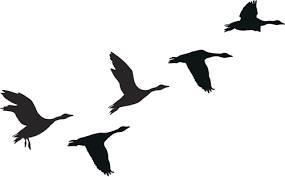Isabel and I want to share this with you. We hear a lot of former and recovering addicts describe the grim and lonely hours waiting for them on the far side of their addiction. The loneliness and bleakness are real, but that’s not the end. It’s a stage in a transformation that can be breathtaking.
WILD GEESE
-by Mary Oliver
| You do not have to be good. |
| You do not have to walk on your knees |
| for a hundred miles through the desert repenting. |
| You only have to let the soft animal of your body |
| love what it loves. |
| Tell me about despair, yours, and I will tell you mine. |
| Meanwhile the world goes on. |
| Meanwhile the sun and the clear pebbles of the rain |
| are moving across the landscapes, |
| over the prairies and the deep trees, |
| the mountains and the rivers. |
| Meanwhile the wild geese, high in the clean blue air, |
| are heading home again. |
| Whoever you are, no matter how lonely, |
| the world offers itself to your imagination, |
| calls to you like the wild geese, harsh and exciting – |
| over and over announcing your place |
| in the family of things. |
https://www.youtube.com/watch?v=lv_4xmh_WtE

Leave a Reply